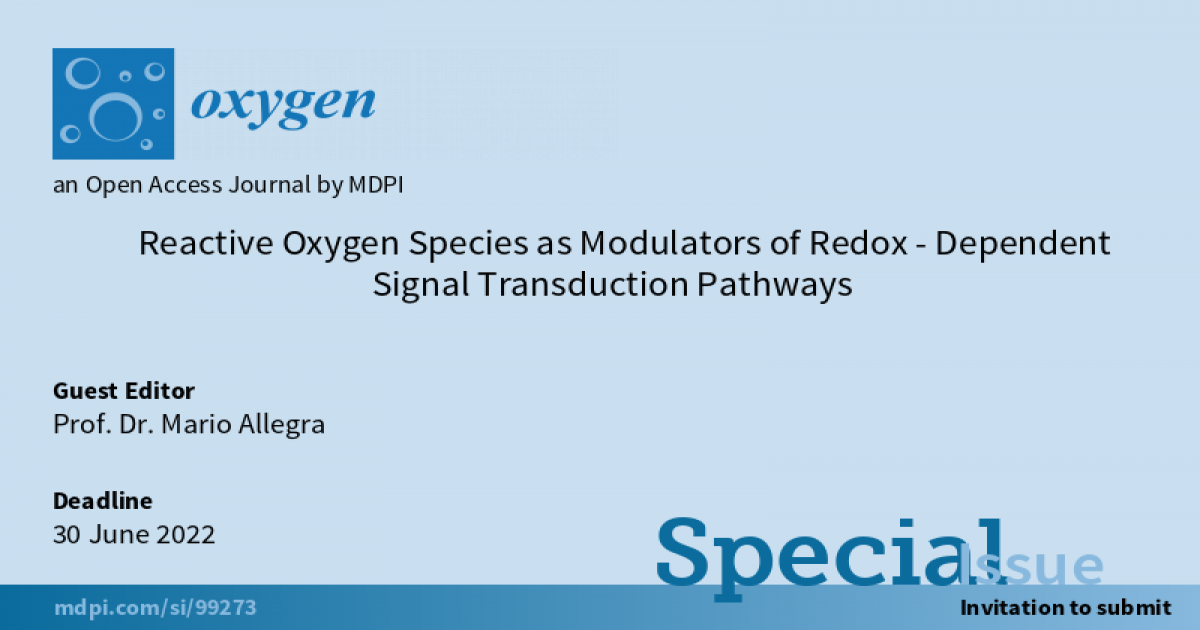Reactive Oxygen Species as Modulators of Redox-Dependent Signal Transduction Pathways
A special issue of Oxygen (ISSN 2673-9801).
Deadline for manuscript submissions: closed (31 October 2022) | Viewed by 1028

Special Issue Editor
Interests: eryptosis; antioxidants; oxidative stress; signaling patterns; inflammation; brain metabolism
Special Issues, Collections and Topics in MDPI journals
Special Issue Information
Dear Colleagues,
Redox systems, which are controlled by the exogenous or endogenous signals that govern the life of cells, tissues, and the entire body, have received the interest of scientists in different disciplines, from basic science to scientific applications. Indeed, while adequate levels of reactive oxygen species (ROS) are essential for sustaining cell proliferation and survival, alterations of redox homeostasis may bring about cell dysfunction and death. Under physiological conditions, therefore, a strict balance between the generation and disposal of ROS ensures the proper functioning of redox-sensitive signalling proteins. Along these lines, understanding the mechanisms underlying cellular redox homeostasis may help us to develop new therapeutical strategies to counteract the development of a wide range of redox-dependent pathologies, including cardiovascular, neurodegenerative, and inflammatory-based diseases and cancer.
The aim of this Special Issue is to bring together recent research, in the form of either original research papers or reviews, on the activity and control of redox-regulated cell systems in physiological processes and pathological conditions. These can include both in vitro and in vivo studies aiming to explore molecular mechanisms as well as cell and body responses. In addition, the role of phytochemicals and xenobiotics in the control of redox-dependent pathophysiological conditions will be considered.
Prof. Dr. Mario Allegra
Guest Editor
Manuscript Submission Information
Manuscripts should be submitted online at www.mdpi.com by registering and logging in to this website. Once you are registered, click here to go to the submission form. Manuscripts can be submitted until the deadline. All submissions that pass pre-check are peer-reviewed. Accepted papers will be published continuously in the journal (as soon as accepted) and will be listed together on the special issue website. Research articles, review articles as well as short communications are invited. For planned papers, a title and short abstract (about 250 words) can be sent to the Editorial Office for assessment.
Submitted manuscripts should not have been published previously, nor be under consideration for publication elsewhere (except conference proceedings papers). All manuscripts are thoroughly refereed through a single-blind peer-review process. A guide for authors and other relevant information for submission of manuscripts is available on the Instructions for Authors page. Oxygen is an international peer-reviewed open access quarterly journal published by MDPI.
Please visit the Instructions for Authors page before submitting a manuscript. The Article Processing Charge (APC) for publication in this open access journal is 1000 CHF (Swiss Francs). Submitted papers should be well formatted and use good English. Authors may use MDPI's English editing service prior to publication or during author revisions.
Benefits of Publishing in a Special Issue
- Ease of navigation: Grouping papers by topic helps scholars navigate broad scope journals more efficiently.
- Greater discoverability: Special Issues support the reach and impact of scientific research. Articles in Special Issues are more discoverable and cited more frequently.
- Expansion of research network: Special Issues facilitate connections among authors, fostering scientific collaborations.
- External promotion: Articles in Special Issues are often promoted through the journal's social media, increasing their visibility.
- Reprint: MDPI Books provides the opportunity to republish successful Special Issues in book format, both online and in print.
Further information on MDPI's Special Issue policies can be found here.





